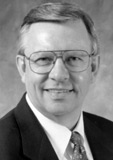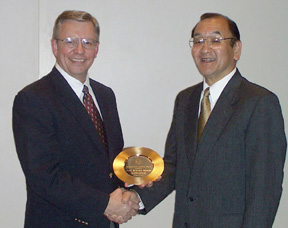Charles Krobot, Pharm.D., says there have been times when he’s questioned whether his messages in his law and ethics course have gotten through to students.

This fall, pharmacy students sent a strong affirmative answer to Dr. Krobot: They selected him as the recipient of the 2002 College of Pharmacy Distinguished Teaching Award.
“It was a complete surprise to me, and even more of a surprise since it was the students who selected me. That makes it the most treasured,” Dr. Krobot said. “If I’m helping them in some way, shape or form, that’s the bottom line.”
The Distinguished Teaching Award is presented annually to a faculty member to recognize his or her teaching excellence and dedication to student learning. The Dean’s Student Advisory Council selects the award recipient. That council is composed of the college’s elected UNMC Student Senate representative and the president of each class and pharmacy student organization.
 |
Charles Krobot, Pharm.D., with Clarence Ueda, Pharm.D., Ph.D., dean of the College of Pharmacy. |
“Dr. Krobot has been a tremendous addition to the pharmacy practice faculty, and personifies the meaning of ‘role-model,'” said Clarence Ueda, Pharm.D., Ph.D., dean of the College of Pharmacy. “He’s the type of health-care professional/pharmacy practitioner that we want all of our students to emulate.”
A native of Stuart, Neb., Dr. Krobot earned his bachelor’s degree in pharmacy from the University of Nebraska in 1969. He was a clinical pharmacist at Bishop Clarkson Memorial Hospital from 1969 to 1994, then moved across Dewey Avenue to work with the oncology team at University Hospital. He still serves in that role at Nebraska Health System, which was formed with the merger of the two hospitals in 1998.
Dr. Krobot went back to school in the early 1980s, earning his Pharm.D. from the College of Pharmacy in 1984. He was among the class of registered pharmacists who were offered an opportunity to receive Pharm.D. degrees in one year, as the college was transitioning from a three-year curriculum to a four-year curriculum.
“I had to take 50 credit hours before I even started that year. Some of the courses had changed so much, and we were talking about prescription drugs that hadn’t even been discovered in 1969,” Dr. Krobot said. “But that was the best thing I’ve ever done, professionally. That really changed the way in which I practiced pharmacy.”
He didn’t begin to formally instruct pharmacy students, though, until the late 1990s, when colleague Sam Augustine, Pharm.D., asked him to give a few lectures on law and ethics. In 2000, Dr. Krobot became a part-time faculty member in the department of pharmacy practice. In addition to his law and ethics class for third-year pharmacy students, he was designated coordinator of the Early Practice Experience Program.
To keep students interested in his class, Dr. Krobot brings current event issues into the classroom. For instance, he discussed recently how the current special session on the death penalty may affect pharmacists.
“I think the students appreciate that. It makes it more interesting, and it shows them that they have a vested interest in keeping up with laws and government,” Dr. Krobot said. “I like teaching that way, as well. I can explain a law a whole lot easier when I can give an example that the students can relate to.”
Dr. Krobot also encourages pharmacists to get involved professionally. He currently is president of the Nebraska Pharmacists Association and is a member of several other groups, including a state task force that advises government officials on pharmacists’ role in health care and the regulations that should govern them.
Dr. Krobot says his network of pharmacists and state officials can assist him if students stump him on a law question. He finds it refreshing that students are inquiring enough to ask questions. He’s encouraged, he said, that the pharmacy profession will be in such good hands when the current students are in leadership positions at the local and state levels.
“I’ve been so impressed with the quality of students we have here,” Dr. Krobot said. “I just try to set a good example and make myself available to answer questions that they may have.”
Dr. Krobot is married to Mary Ellen Krobot, a kidney/pancreas transplant coordinator at NHS. They have two grown daughters. Amy Rummel is the media relations coordinator for the Joslyn Art Museum in Omaha, and Julie Girard is an accountant with Proctor and Gamble in Cincinnati, Ohio.